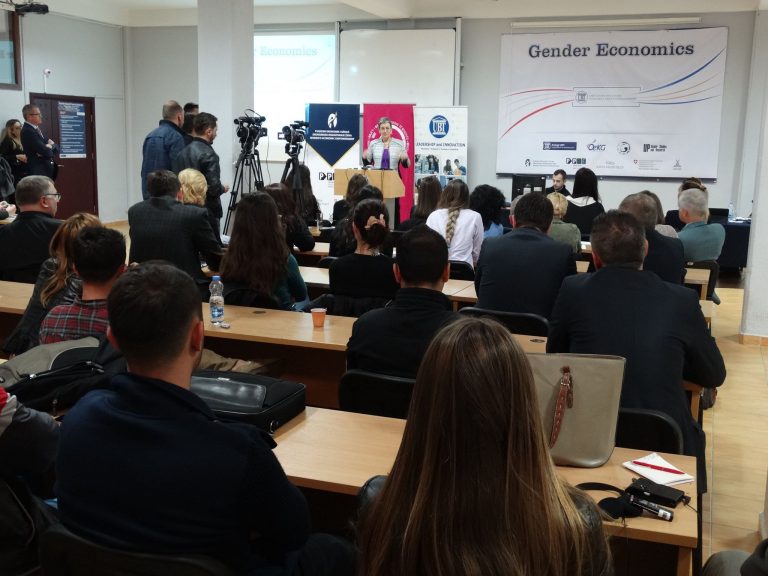
Gender Aspects in Economy Discussed – UBT Center for Economy and Gender Equality Established
10/11/2015The conference “Gender Aspects and Economy” organized by the UBT and the Austrian-Kosovar Society treated today a number of issues of interest and brought together a number of dignitaries, starting from Mrs. Ulrike Lunacek, Vice-President of the European Parliament and Parliament’s Rapporteur for Kosovo, Kosovo Deputy Minister for Economic Development Besa Zogaj, and Jeta Krasniqi, an advisor to the President of the Republic of Kosovo.
The UBT Center for Economy and Gender Equality was also launched on this occasion.
Conference moderator Gunther Fehlinger, chairman of the Austrian-Kosovar Society, noted that the UBT Center for Economy and Gender Equality would give its professional contribution in treating a number of issues raised by our society related to the gender equality in many areas, with a special emphasis on the economy.
After the exhaustive speech of Mrs. Lunacek, which attracted huge interest among the participants, the conference continued with the presentations and debates on different aspects of gender equality in economy.
Besa Zogaj, Deputy Minister of Economic Development of Kosovo, said among others that, albeit the fact that the Kosovo Government has undertaken different initiatives to involve women in the job market, there were still sectors where the participation of women was quite low, as is the case in fields of energy, mining, and technology.
“Around 46% of the population fit for work do not have jobs. This includes a big number of women. In addition, there are sectors with no women employed in them, while in some others participation of women is very low, such as in mining, information technology, and energy,” Zogaj said.
Jeta Krasniqi, an advisor to the Kosovo President, said boosting of economy is one of the key factors for the development and rising of awareness among the women about completion in the job market.
“Investments to boost of economy, associated with full support by other factors, are the factors that impacts on the development and employment and/or advancement of women in the current job market,” Krasniqi said.
Merita Limani, a specialist on the property right, spoke about a property rights program developed by the USAID. She noted that the program had to do with empowering of the women’s right in this respect. Limani added that Kosovo had laws regulating this sector, but, according to her, the legislation is weak if the laws are not respected.
“Around 70% of property does not have liable owners, which is an indication, because in cases of divorce, women cannot inherit anything from their husbands. There are laws regulating this system in Kosovo, but the legislation has proven to be weak because the laws are not being respected,” Limani said among other things.
Ereza Vela-Berisha, a former UBT student who is now manager of the WEE Project, noted that the Kosovar women faced a number of barriers, such as family inheritance, because in most of the cases the property belongs to the male members, then choosing of a profession, as the women are usually imposed to choose easy professions, like teachers, doctors, and so on.
Women face a number of barriers in the society, but it is high time to focus on the job market in the professions like technology, politics, and others, Vela-Berisha noted.
Dr. Vjollca Krasniqi, a professor of psychology, said economy run by women was growing in many countries, while in the past it was only a vocation for men and decision-making by women was rare. She noted that there had to be equal rights in family, economy, and all walks of life.
Gender issues in economy are considered as a local problem but they have to be global, said Dr. Krasniqi, adding that it is important that women become involved in the macroeconomic policies as well.
Researcher Nicole Farnsworth said there were those employed, those unemployed, and those who survive economically, and women wished to belong to the third group. She advised that women in Kosovo should express their skills otherwise the country would not be able to move forward.
“We have to strive because no one will this for us. If we do not stand for ourselves, we will be staying at home, we will be working as housewives, and we will be dealing only with raising of children,” she said.
The presentation of the panelists was followed by an interactive debate with the audience. Many ideas were and business opportunities for women, who make round percent of the population, were presented.